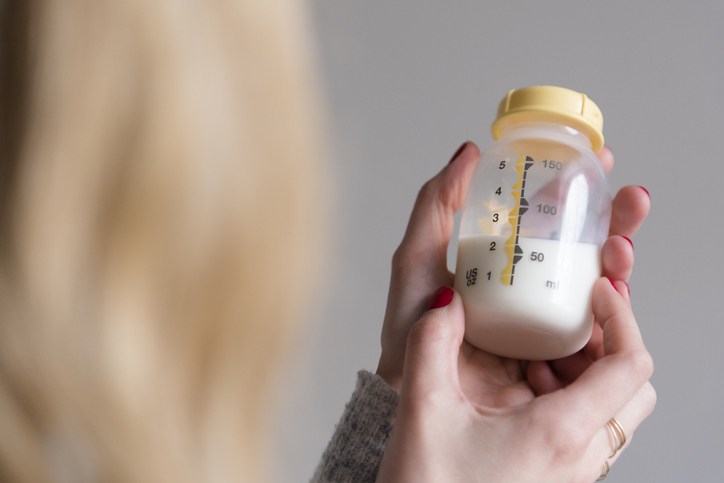Breast Milk May Provide Protection From Viruses

In recent years, women have been on a mission to normalize breastfeeding. And it makes perfect sense. If a baby is hungry, then that baby needs to be fed even if the mother is in a public space.
So many female celebrities have opened up about their experiences and challenges with breastfeeding. It’s not always an easy task. For example, a woman may have problems due to insufficient milk supply, the infant failing to latch on, mastitis (breast tissue inflammation usually caused by infection) and more.
Because of issues such as these, many women stop breastfeeding. But I think actress and model Coco Austin, who is the wife of famous rapper Ice-T, shared a really valuable method without even realizing it when it comes to breastfeeding.
In one interview, Austin explained that at first her baby girl was breastfeeding without much difficulty. But then, at five-months-old her daughter got sick and was not breastfeeding. She had to make the switch to bottle-feeding. Austin said that once her daughter got better, she wanted the bottle more and needed more milk.
“...so I have to go from breastfeeding to formula, breastfeeding to formula, but I wish she would want a little more of me,” Austin shared.

Austin may have felt defeated because she had to turn to formula, but what she may not realize is that giving her daughter even just a little bit of breast milk when she could may have significantly helped protect her daughter from viruses.
A recent study conducted by researchers at Perelman School of Medicine at the University of Pennsylvania examined hundreds of babies who were breastfed. “Even small amounts of breast milk strongly influences the accumulation of viral populations in the infant gut and provides a protective effect against potentially pathogenic viruses,” according to one report discussing the study.
“This latest research could influence strategies for the prevention of early gastrointestinal disorders, and encourage mothers to feed babies breast milk even when mixed with formula.”
Basically, this all has to do with the gut microbiome. The researchers of the study observed that when babies were first delivered, they had little or no colonization in their guts. This means that not a lot of microbes were present in the gut.
A baby’s first stool is called meconium, and the researchers assessed the number and types of viruses in the first stools of the babies. They also looked at stools once the babies started to get a little older. (Babies in the United States and Botswana were included in the study).
The researchers found that once the babies were a month old, ”... populations of viruses and bacteria were well developed, with numbers of viruses reaching a billion per gram of gut contents.”
“Most of the first wave of viruses turned out to be predators that grow in the first bacteria that colonize the infant gut. Later, at four months, viruses that can replicate in human cells and potentially make humans sick were more prominent in the babies' stools.”
Through this research they found that breast milk appeared to provide protective effects by suppressing the accumulation of potentially pathogenic viruses. And they saw these protective effects even if the baby was given formula mixed with breast milk.
"These findings can help us better understand why some babies get sick and develop life-threatening infections in their first months of life," said one of the senior authors of the study.
The results of this study are not shocking to me, as there has also been research which suggests that breast milk helps protect babies from bacterial infections.
But I think that one of the biggest takeaways from this study is that breastfeeding does not have to be this “all or nothing approach.” So many new mothers feel pressure to be successful breastfeeders and feel like failures if they are not completely successful.
It’s okay to use formula. Just know that even a little bit of breast milk mixed in may be very beneficial to your baby.
Be Proactive
If you are a new mom struggling with breastfeeding due to issues such as breast tissue inflammation and trouble with your infant latching on, speak with a competent healthcare professional on ways you can possibly overcome these issues.
It is also well documented that certain nutrients including vitamin D, folate, calcium, magnesium and iron are under-consumed in the United States. These are all nutrients which are beneficial for breast milk production. Below are a few foods you can include in your daily diet to help you consume adequate amounts of these vital nutrients:
- For vitamin D: swordfish, salmon, tuna, sardines, beef liver, milk, yogurt, eggs, cheese and orange juice fortified with vitamin D.
- For folate: beef liver, spinach, black-eyed peas, asparagus, brussels sprouts, avocado, broccoli, mustard greens, kidney beans, wheat germ, tomato juice, oranges, bananas and cherimoyas.
- For calcium: yogurt, mozzarella cheese, cheddar cheese, cottage cheese, sardines, milk, calcium-fortified soy milk, calcium-fortified orange juice, tofu, salmon, turnip greens, kale, Chinese cabbage, broccoli and jackfruit.
- For magnesium: leafy green vegetables (like spinach), legumes, nuts, seeds and whole grains. Foods with fiber, like cherries, are also good sources of magnesium, and many cereals are fortified with this essential mineral.
- For iron: there are two types of iron -- heme and non-heme. Heme iron is rich in lean meat and seafood. This type of iron is more bioavailable, meaning your body can use it better. Non-heme iron is found in nuts, grains, vegetables and other fortified products.
Maintaining nutritional balance is also key. Take routine nutrient tests in order to determine if you have any nutrient imbalances or deficiencies. If you do, a competent health care professional can work with you on making the necessary dietary changes and recommend quality supplements you can take if necessary.
Enjoy your healthy life!
The pH professional health care team includes recognized experts from a variety of health care and related disciplines, including physicians, attorneys, nutritionists, nurses and certified fitness instructors. This team also includes the members of the pH Medical Advisory Board, which constantly monitors all pH programs, products and services. To learn more about the pH Medical Advisory Board, click here.







